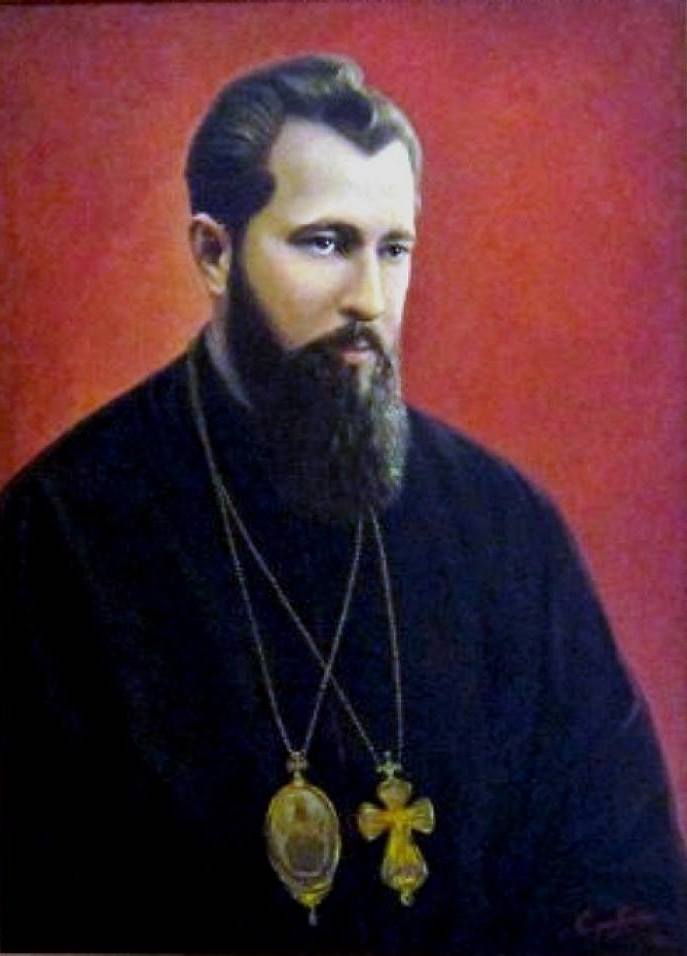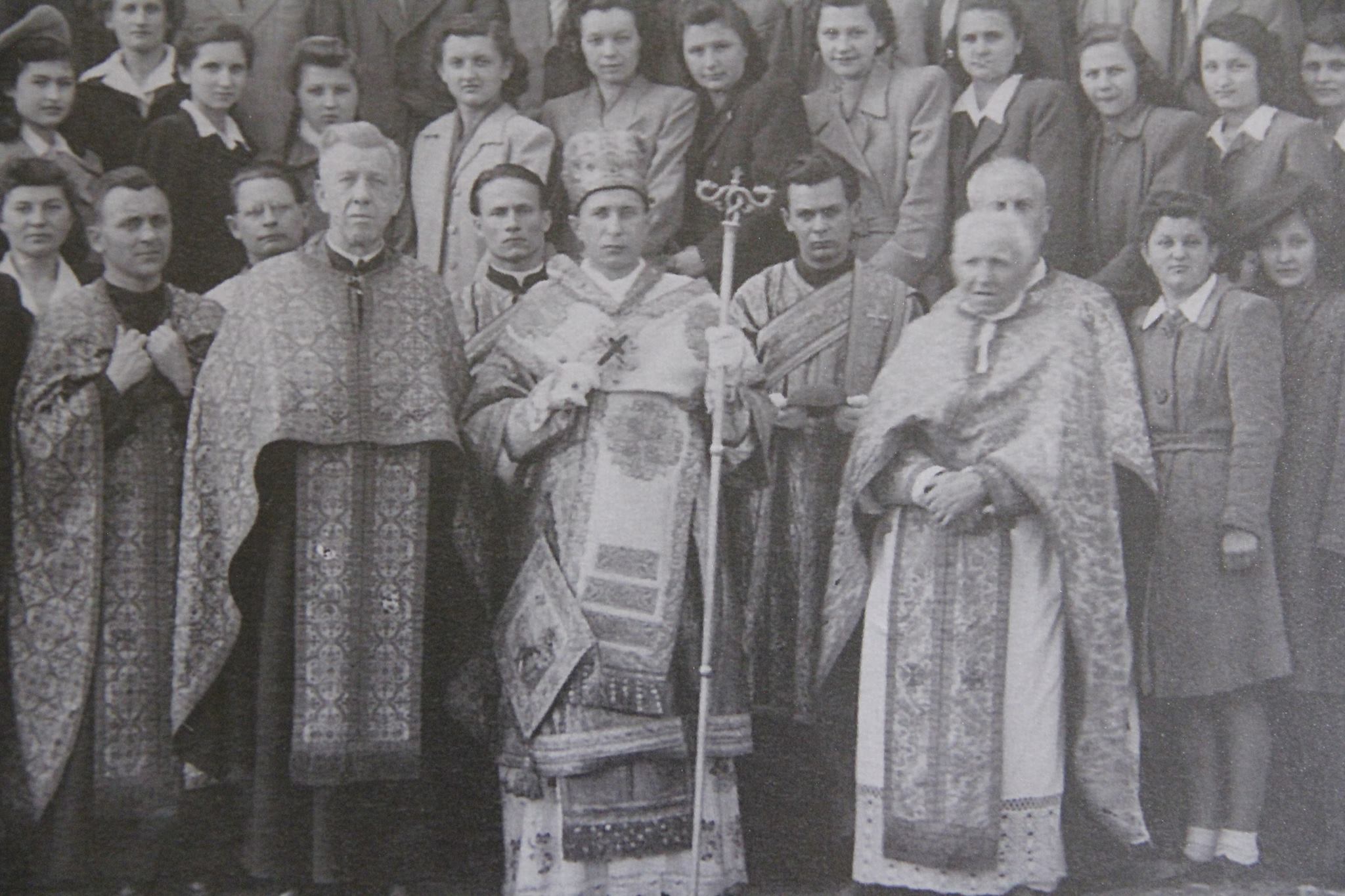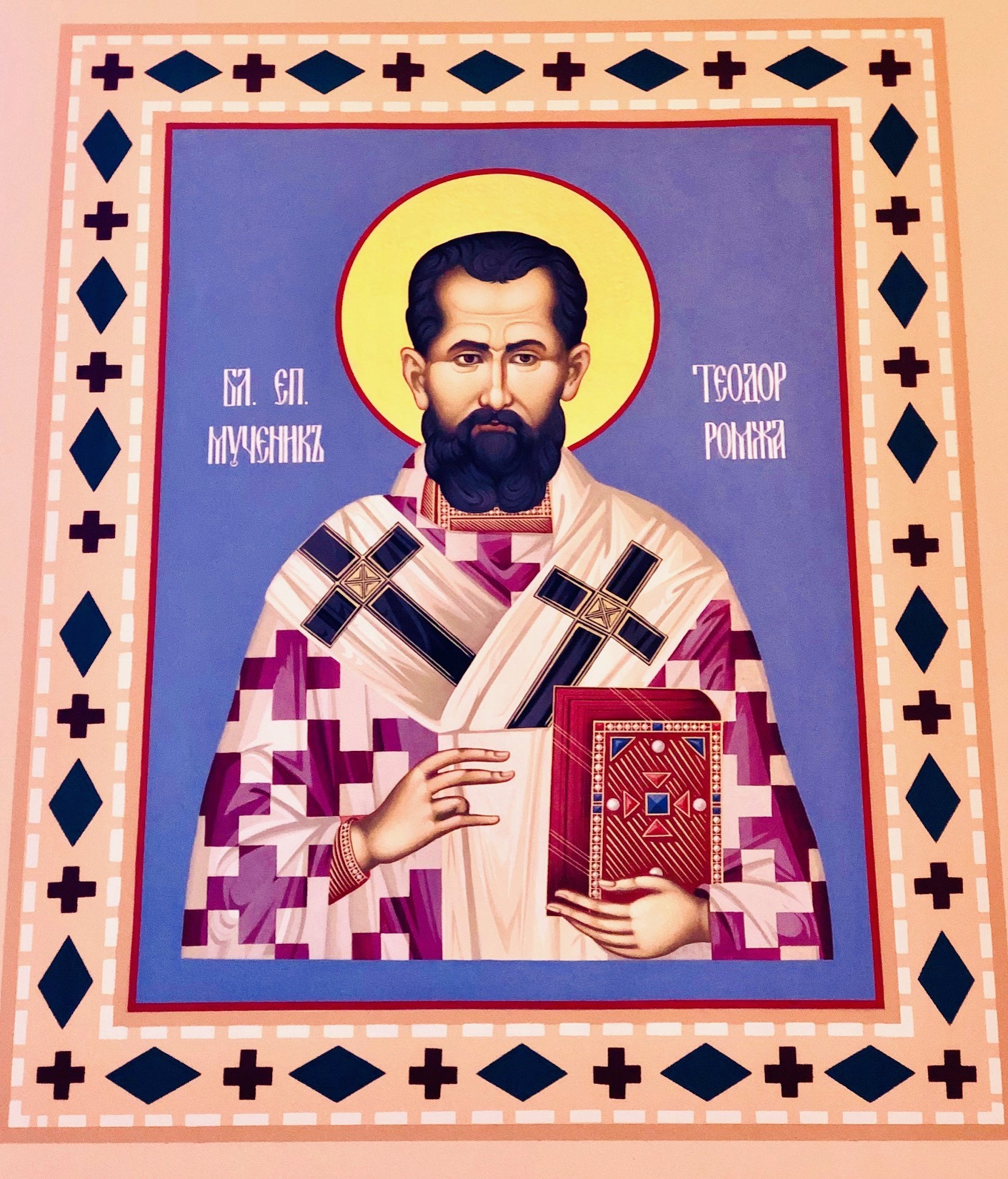Blessed Bishop +Theodore Romzha
Bishop Theodore Romzha is one of four Saintly Bishops, along with Bishop Pavel Gojdich, Bishop Basil Hopko, and Bishop Alexander Chira, who, by their courage, charity and intrepid faith, inspired our Ruthenian people in the darkest moments of their history. By their great sufferings, humiliating imprisonment, and violent death they gave living witness to their Catholic faith and glorified Christ’s exalted name.
I love you, O Lord, my strength; You are my stronghold and my refuge!
These were the words which Bishop Theodore G. Romzha, the Apostolic Administrator of the Mukachevo Eparchy (1944-1947) chose as the motto for his episcopal ministry. At the age of 33, he faced the one of the most brutal and bloody persecutions of a Christian community in modern times, ultimately making the ultimate sacrifice for his flock and his faith.
Bishop Theodore G. Romzha was born of humble parentage on April 14, 1911 in Velikij Bychkiv, in the heart of the colorful district of Maramorosh, Subcarpathian Ruthenia. He was a pious and gifted young boy, and his only ambition was to become a priest. He received his secondary education at the gymnasium (high school) in Chust. Due to his friendly disposition and scholastic achievements he became one of the most popular students. His popularity increased even more when he proved himself as an all-around athlete, excelling in soccer. At his graduation, he took everybody by surprise when he announced his intention of becoming a priest; and was sent to Rome for his priestly formation.
He lived at the German-Hungarian College in Rome for the first two years of his studies; then, in 1932, he moved to the Russian Pontifical Seminary, known as the “Russicum," in order to prepare himself for missionary work in Soviet Russia. It was indeed a providential step, since at the “Russicum" he was expected to study communist atheism and its ideology; unwittingly preparing himself for the Soviet occupation of his native land. He was ordained to the priesthood in Rome on Christmas Day, December 25, 1936.
In the summer of the following year he came home to celebrate his first Divine Liturgy in his own country with the intention of returning to finish his doctoral dissertation. But instead of returning to Rome, he was drafted into military service and sent to protect his country against the German invasion. To his friend in Rome he confided: “I am going to the front with a deep conviction of doing the will of God. Therefore, I do not fear what will happen to me."
After Father Romzha's discharge from the army in August, 1938, the danger of another approaching war remained. For this reason Bishop Alexander Stojka (1932-1943) did not permit him to leave the country, but appointed him to a forgotten parish in Berezovo, Maramorosh District, where the young Father Romzha became a poor pastor among poor people. There were times when he could afford only one meal a day while donating from his own purse to help his needy parishioners. To a curious friend in Rome he wrote: “I live here as a pauper and yet I feel happy and satisfied." Father Romzha was a good and dedicated priest, teaching his parishioners to know and live their Faith by his own example.
In March, 1939, the Hungarians occupied Subcarpathian Ruthenia by force, precipitating both political and ecclesiastical changes. Bishop Stojka was forced by the Hungarian government to reorganize the seminary; and in the fall of 1939, Father Romzha was appointed Spiritual Director and Professor of Philosophy at the Eparchial Seminary in Uzhorod. One of his students later recalled: “He was strict and demanding as a Professor, but as a Spiritual Director he was fatherly and kind. He knew how to inspire us and to bring out the best in us. Staying in close contact with us, his students, he was able to transplant into our hearts the main features of his strong priestly character: his dedication, genuine piety and generosity of heart.”
Even at the seminary, Father Romzha found time for pastoral work by assisting in neighboring parishes, and conducting missions and retreats for young students. Every penny he earned he generously distributed to the poor. To the mentioned friend in Rome he wrote: “I am living very unpretentiously, and yet my pockets are always empty. But I am not discouraged, since I am working not for the money but to please God.” Bishop Stojka greatly appreciated the dedicated work of Father Romzha, and in 1942 obtained for him Papal honors. Even so, he remained a humble and dedicated priest, inspiring and winning the admiration and respect of all those who met him.
On May 31, 1943, during a critical time during the war, Bishop Alexander Stojka suddenly died. In view of the uncertainties of the time, the Holy See appointed Bishop Nicholas Dudash, OSBM, of Hajdudorog, as the temporary administrator of the Mukachevo Eparchy. While the Soviet army was rapidly approaching the Carpathian Mountains, the Holy See promptly appointed Archpriest Theodore G. Romzha to succeed Bishop Dudash as the Apostolic Administrator of Mukachevo; and his episcopal consecration took place in Uzhorod, September 24, 1944. A month later, the entire territory of the Mukachevo Eparchy was occupied by the Red Army. Bishop Romzha was informed that Subcarpathian Ruthenia would be incorporated into postwar Czechoslovakia as an autonomous province; however, it soon became evident that the Soviets would not relinquish this politically strategic region. Consequently, on June 29, 1945, Subcarpathian Ruthenia was officially incorporated into Soviet Ukraine; and the young and inexperienced Bishop Romzha found himself and his flock under Soviet rule.
At first, Bishop Romzha tried not to antagonize the Soviet authorities, in spite of abusive and violent actions committed by the Soviet soldiers against the clergy; but when the Soviet authorities started to expel priests from their parishes at random and confiscate church property, he was forced to protest. The Soviets had a ready answer: to ensure the continuance of his ministry and the safety of his clergy, Bishop Romzha must renounce all allegence to the Holy See, place himself under the jurisdiction of the Partriarch of Moscow and encourage his flock to do the same. Bishop Romzha immediately replied: “I would rather die than betray my Church!” Thus began the open persecution of the Byzantine Catholic Church in Subcarpathia. In the fall of 1945, Patriarch Alexis of Moscow appointed Bishop Nestor Sydoruk of Umany to head the Orthodox Eparchy of Mukachevo. Nestor was announced by the Soviet press to be the only legally appointed bishop, and received full support from the Soviet authorities. Intimidation and imprisonment of Byzantine Catholic priests followed; and the official liquidation the Byzantine Catholic Eparchy of Mukachevo was underway.
Rather than flee, Bishop Romzha decided to fight. Although the Soviet authorities confiscated his car, he traveled long distances by horse and buggy, just to reassure his faithful and to encourage them to persevere until death, saying, “They are taking from us our own priests and churches, but they will never be able to take away our faith from us.” During these extensive and dangerous visitations, Bishop Romzha tried to sustain the faith of the weak, to reassure the wavering, and to plead with those intimidated: “Faith is our greatest treasure on this earth. To preserve our faith we must even be ready to lay down our life. If we must die, then let us die as true martyrs, defending our faith. One thing is sure: that we never will abandon our faith nor betray our Church.” The faithful, supported by dedicated clergy, responded enthusiastically, and stood united behind their fearless shepherd. Even some Orthodox parishes, seeing the violence and injustice perpetrated by the Soviets, asked Bishop Romzha to accept them back into the Catholic fold.
During these days of violence and open persecution Bishop Romzha offered his prayers and sufferings for the perseverance of his clergy and the faithful he risked so much to serve. He was sustained by his unshakable confidence in God's Providence; and down deep in his courageous heart he vividly felt the protection of the Theotokos, the Mother of God. There was no power that could shake his loyalty to the Holy See; in his mind there was only “one, holy, Catholic and apostolic Church,” established by our Lord on the rock of Peter and governed by His Vicar on the earth. For this truth Bishop Romzha was ready to sacrifice his own life.
Unable to intimidate Bishop Romzha, the Soviets decided to liquidate him, and staged a highway accident. The horse drawn carriage in which the Bishop was returning home from the rededication of the parish church of Lavki, near Mukachevo, was rammed by a military truck. Bishop Romzha was badly injured, but survived; and passersby took him to the hospital in Mukachevo where, after a few days, he began to regain his strength. Then suddenly, early on the morning of November 1, 1947, he was found dead.
The night before Bishop Romzha's death, the director of the hospital and a strange nurse, who had disappeared the next day, were seen entering the Bishop's room about midnight. The Soviet authorities announced that Bishop Romzha died from injuries suffered in his highway accident; but a later investigation showed that he had, in fact, been poisoned.
Blessed Theodore Romzha was beatified by Pope John Paul II on June 27, 2001. His relics are enshrined in Holy Cross Cathedral in Uzhorod, Transcarpathia.
His Grace, Bishop John Kudrick of Parma, has compiled a devotional booklet entitled A Prayer Journey Through the Great Lenten Fast and Great and Holy Week, Inspired by Blessed Theodore Romzha. For more information, please contact the Eparchy of Parma Office of Evangelization, 1900 Carlton Road, Parma, Ohio 44134.
Source: Eparchy of Passaic
Read More
Bishop Theodore G. Romzha: A Victim Of Soviet Persecution
Byzantine Catholic Archeparchy of Pittsburgh
The Servant of God Bishop Theodore Romzha
Eternal Word Television Network, Inc. (EWTN)
A New Shrine In Honor Of Blessed Theodore Romzha
Shrine of Our Lady of Perpetual Help, Olympia, Washington


